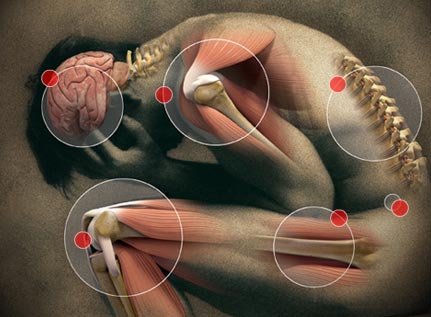What Is Chiropractic?
Chiropractic is a highly skilled treatment by trained professionals. The word chiropractic comes from Greek, meaning "treatment by hand". It focuses on the source of your pain and discomfort, not the symptoms. It's hands-on treatment that works.
Chiropractors: Evidence based & Trained Health Professionals
Chiropractic adjustment techniques have been researched extensively. Complications are rare and side-effects such as temporary soreness, are usually minor. Dr. Douglas is well trained to determine if your problem will respond to chiropractic care or if you require referral to another health care provider.
In Canada, chiropractors are required to complete a minimum of three years of university, followed by four years at an accredited chiropractic college. A chiropractic student receives over 4500 hours of education, much of it in a supervised clinical practice. Once students have completed their education, they must pass both provincial and national exams to earn the right to practice as a Doctor of Chiropractic (D.C.).
How does chiropractic work?
Your body moves and holds different postures through the specific interaction of muscle, joints and nerves. When everything is working well, the body can perform and function in a pain free state. The stress of daily living, injuries, or accidents can cause dysfunction in the interaction of these systems. Over time, this dysfunction manifests itself as pain. Chiropractors understand how to relieve this pain. They are specially trained to find the source of your pain, diagnose the problem, and offer a customized treatment specific to your condition that will allow you to return to proper function. Chiropractors may use a wide variety of treatment modalities including deep muscle work, electrical stimulation, exercise, adjustments, or acupuncture. The combination of these therapies is dependent on the conditions and the patient's goals.
What is an adjustment?
An adjustment is a highly skilled and precise movement usually applied by hand to a joint of the body. The adjustment loosens the joint to restore proper movement and optimize function. When a joint is adjusted, a gas bubble escapes causing the popping noise you may have heard about.
When should I consider Chiropractic care?
There are many reasons to seek chiropractic care. Work, accidents, sports injuries, household chores, even the stress of daily living can cause painful joints and spinal problems. Even if you do not have painful symptoms, chiropractic care can help you maintain healthy spine and joint function.

Here are some of the most common reasons why more than 4 million Canadians visit a Chiropractor each year:
- Back pain;
- Neck pain; - Headache;
- Whiplash;
- Strain and sprains from daily activities;
- Repetitive strain injuries;
- Work and sports related injuries;
- Arthritis;
- Restricted movement in the back, shoulders, neck or limbs.

Benefits of Chiropractic Care:
Chiropractic treatment is skilled, hands-on health care that relieves pain and helps your body be at its best. Here are some of the ways it can help you:
- Improved movement in your neck, shoulder, back and torso;
- Better posture; - Relief from headaches, neck and back pain;
- Prevention of work-related muscle and joint injuries;
- Enhanced athletic performance;
- Improved flexibility;
- Relief of pregnancy-related backache;
- Correction of gait and foot problems.
Chiropractic: Myth&Facts:
![]() Chiropractic treatment involves cracking my spine.
Chiropractic treatment involves cracking my spine. ![]()
Fact: One part of chiropractic treatment involves applying quick, precise pressure to the joint, which creates a cracking or popping noise. This is called and adjustment. The popping noise doen't come from your bones, but from the release of a gas bubble when two joints are separated. This is just like when you pop you knuckles, or you scrunch your toes first thing in the morning.
![]() No one should use so much pressure on my spine, that can't be right!
No one should use so much pressure on my spine, that can't be right! ![]()
Fact: The adjustment does not involve a great deal of force. Skill, speed and positioning and timing are more important than force.
![]() I heard cracking your bones can cause arthritis.
I heard cracking your bones can cause arthritis. ![]()
Fact: There is no reason to think there is a connection. In fact, and adjustment increases mobility, reduces pressure on the joints, muscles, and nerves, and allows the spine to return to a natural position.
